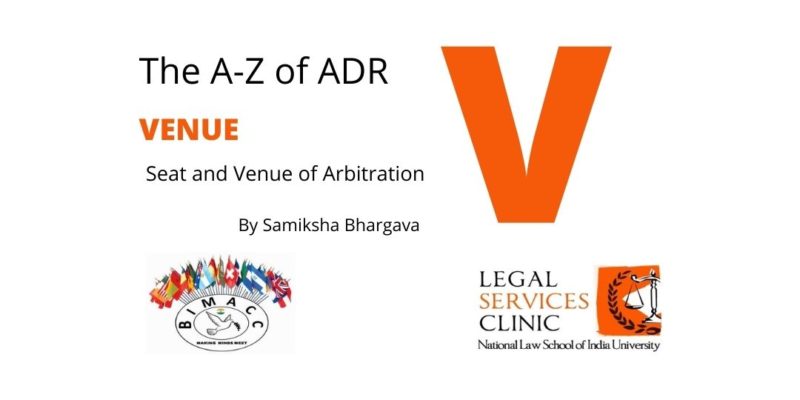
A-Z of ADR: VENUE – Seat and Venue of Arbitration
-Samiksha Bhargava (IIIrd Year, NLSIU Bangalore)
Today, arbitration has gained a lot of importance as a cheap and fast alternative to settle complicated commercial disputes. In so many matters, however, a lot of time is lost to decide as to where the actual arbitration proceedings would take place. Even though most of the time, stipulations such as the seat and venue of arbitration are mentioned in the arbitration agreement itself, yet clarity on such important aspects seems to get buried in huge commercial contracts.
This confusion between the seat and venue of arbitration is a question that has fascinated the jurisprudence for the longest period of time. However, in simple terms, I would define the seat of arbitration as the jurisdiction whose national law governs an arbitration proceeding and the venue of arbitration as the physical location where the arbitration proceedings are held. The seat of arbitration can be quite independent of the venue of arbitration where the arbitral process is to be held. The seat plays an important role in arbitration as it is the courts of the seat that have the supervisory jurisdiction over the arbitral process. There has been a common misconception that the seat and venue of arbitration are the same. However, this is not true. Even if the proceedings take place at different locations, the chosen seat of arbitration would remain unaffected and independent of the geographical location of the proceedings. This can be understood with the help of a simple example – if London is to be the seat of arbitration and India the venue, then it is the London courts that would have the jurisdiction to entertain any challenge to the arbitral award. The parties, then, would not be able to go to the Indian courts claiming that the Indian courts have jurisdiction since the proceedings took place there. Further, the selection of the seat of arbitration also decides the law that would govern the arbitration procedure as well as the process and rights pertaining to enforcement of the arbitral award.[1]
One of the most important judgements in this regard is the case of Enercon (India) Ltd. and Ors v. Enercon Gmbh and Anr,[2]where the Supreme Court discussed the distinction between the seat and venue and ultimately sided with the seat of arbitration for settling any dispute in an appropriate court rather than the venue. Here, the dispute was with respect to non-delivery of supplies under an Intellectual Property License Agreement (IPLA) which contained an arbitration clause. The relevant portion of the arbitration clause stated that the governing law of the IPLA was Indian law; the venue of the arbitration was London; and the provisions of the Indian Arbitration and Conciliation Act, 1996 were to apply. The Bombay High Court, in this case, decided that though London was not the seat of arbitration, the London courts would have concurrent jurisdiction since London was the venue of arbitration. The main issue before the Supreme Court was that assuming that the seat of arbitration was India, whether the London courts would have concurrent jurisdiction as the venue of arbitration in London?[3] In answering this question, the Supreme Court overturned the decision of the Bombay High Court and stated that the mention of London being the venue of arbitration in the agreement does not lead to the interpretation that London was to be the seat because albeit London was mentioned as the venue, the law governing the substantive contract, the law governing the arbitration agreement and the law governing the conduct of the arbitration were chosen to be Indian law and thus the closest and most real connection was with India. Once it is established that the seat of arbitration was in India, Indian courts would have exclusive jurisdiction and London courts cannot have concurrent jurisdiction. Here, the Court adopted the “closest and most intimate connection test” where the system which has the closest connection with the arbitration proceeding or the legal system in which the arbitration is taking place is relevant.[4] Thus, it is not necessary that the venue and seat of arbitration be the same. Even if the proceedings are taking place at a different place, the chosen seat of arbitration would remain unaffected.
There may be situations where the seat of arbitration is not specified and only the place where the arbitration is to take place is provided. The questions that now arises is how to determine whether the place mentioned in an arbitration clause is a “juridical seat” or “venue”. This question was considered in the case of Union of India v. Hardy Exploration and Production (India) Inc.[5]where the arbitration agreement provided Indian law as the governing law of the contract; UNCITRAL Model Law as the governing law of arbitration and Kuala Lumpur as the venue of arbitration. The issue before the court was whether the designation of place, ipso facto, assume the nature of ‘seat’. This question was answered in the negative and it was held that the place mentioned in the agreement would only assume the status of the seat only if “something else is added to it as a concomitant”.[6] What the Supreme Court meant by this was that there should be some conditions precedent that should be satisfied if the venue is to be taken as the seat. A few examples of such conditions could be-
- If the law governing arbitration agreement is the same as the law of the place mentioned as the venue.[7] For example, if the governing law of the contract is that of Malaysia, and the venue is Kuala Lumpur, then the venue would be deemed as the seat.
- If the parties subject themselves to some Institutional Rules.[8] For example, if the parties provided for ICC rules, Paris for arbitration and the place of arbitration was London, then London would become the seat of arbitration. This is because here the ‘lex arbitri’ which determines the seat of arbitration is not some national law but is merely institutional rules.
Thus,
the position of law has been settled by the Hardy
Case that it is not necessary for the venue and seat of arbitration to be
the same. But the venue may be considered as the seat if something else is
added to the place of arbitration as a concomitant. Even though the Court
didn’t expressly lay down the conditions precedent in which ‘place’ can be
construed as the seat, that could be decided by looking at the facts and
circumstances of each case and by looking at the intent of the parties. But
even after all these rulings, there still arise a lot of disputes with respect
to the venue and seat of arbitration. One way this could be avoided is if the
parties aim at drafting an exhaustive arbitral clause where the parties should
expressly state the governing law of the arbitration agreement as well as
procedural rules for conducting the arbitration. Further, parties should
expressly decide the seat of arbitration and should not use venue and seat
interchangeably. Lastly, if the arbitral proceedings are to be held at some
different location as the seat, then the parties should mention that the seat
of arbitration would have exclusive supervisory jurisdiction to entertain any
challenges to the arbitral award. In this way, a lot of confusion between the
seat and venue of arbitration could be avoided.
[1] Enercon (India) Ltd. and Ors v. Enercon Gmbh and Anr [2013] SLP (C) No. 10924 of 2013.
[2] SLP (C) No. 10924 of 2013.
[3] ibid.
[4] Enercon (n 1).
[5] Civil Appeal no. 4628 of 2018.
[6] Hardy (n 5).
[7] Dozco India v. Doosan Infrastructure [2011] 6 SCC 179.
[8] Yograj Infrastructure v. Ssang Yograj Engineer [2011] 9 SCC 735.
-Samiksha Bhargava (IIIrd Year, NLSIU Bangalore)
Samiksha Bhargava is a Third Year Law Student at the National Law School of India University (NLSIU), Bangalore.
BIMACC expresses its gratitude towards the author and to the members of the Legal Services Clinic, National Law School of India University (NLSIU) for their support in our collaborative efforts to promote ADR with this series titled “A-Z of ADR”. The purpose of this series is to increase the understanding of certain fundamental concepts of Alternative Dispute Resolution.
The Legal Services Clinic is a student-run committee that provides free legal services to the socially and the economically backward sections of the society who have difficulty accessing the judicial system. It also has a mandate of spreading legal awareness and providing free legal assistance to those who cannot afford it.
Website: www.legalservicesclinic.org/
Facebook: @legalservicesclinic
Email: lsc.nlsiu@gmail.com
Phone Number: 073586 73214
Disclaimer: The views and opinions expressed in this blog are those of the author and do not necessarily reflect the official policy or position of BIMACC, any of the members of the Board, or the empanelled neutrals.
